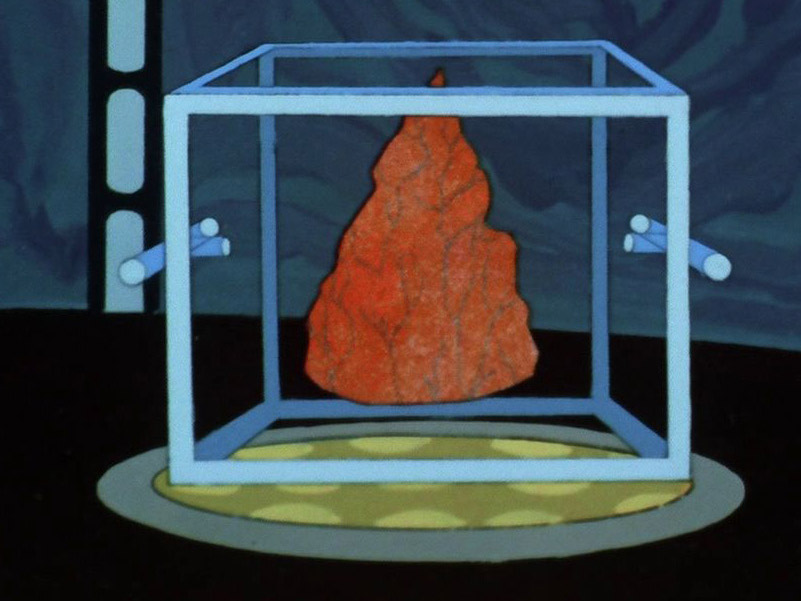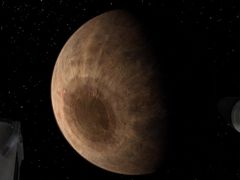Difference between revisions of "antimatter"
m |
m |
||
| Line 1: | Line 1: | ||
| − | {{ImageInfoBox2|file= | + | {{ImageInfoBox2|file=antimatter-tas07.jpg|caption=Antimatter ({{TAS07}})}} |
{{First|{{TOS07}} ([[1966 (Production)#SEP29|29 Sep 1966]])}} | {{First|{{TOS07}} ([[1966 (Production)#SEP29|29 Sep 1966]])}} | ||
{{Ad|AmazonSTSL}} | {{Ad|AmazonSTSL}} | ||
| Line 5: | Line 5: | ||
{{BannerPrime}} | {{BannerPrime}} | ||
Antimatter is composed of subatomic particles of the same mass as normal matter, but with an opposite charge; an [[antiproton]], for example, has the same mass as a positively-charged [[proton]], but with a negative charge. When antimatter particles come into contact with corresponding particles of matter, the result is mutual annihilation. All of the mass of the particles is converted into energy in the form of [[gamma radiation]], the most energetic photons in the [[electromagnetic radiation]] spectrum. When [[electrons]] and [[positrons]] collide, the result is a burst of gamma rays whose energy is 511 million electron volts (MeV).<ref name="STSL"/> A matter/antimatter reaction was used as the main energy source for starships like the [[U.S.S. Enterprise NCC-1701|U.S.S. ''Enterprise'' NCC-1701]].<ref name="TOS07"/> One ounce of antimatter was sufficient to devastate an entire hemisphere of [[Tycho IV]] and rip away half the planet's [[atmosphere]] when used as a bomb against the [[dikironium cloud creature]] on [[Stardate]] [[2268#SD3619|3620.7]].<ref name="TOS47"/> | Antimatter is composed of subatomic particles of the same mass as normal matter, but with an opposite charge; an [[antiproton]], for example, has the same mass as a positively-charged [[proton]], but with a negative charge. When antimatter particles come into contact with corresponding particles of matter, the result is mutual annihilation. All of the mass of the particles is converted into energy in the form of [[gamma radiation]], the most energetic photons in the [[electromagnetic radiation]] spectrum. When [[electrons]] and [[positrons]] collide, the result is a burst of gamma rays whose energy is 511 million electron volts (MeV).<ref name="STSL"/> A matter/antimatter reaction was used as the main energy source for starships like the [[U.S.S. Enterprise NCC-1701|U.S.S. ''Enterprise'' NCC-1701]].<ref name="TOS07"/> One ounce of antimatter was sufficient to devastate an entire hemisphere of [[Tycho IV]] and rip away half the planet's [[atmosphere]] when used as a bomb against the [[dikironium cloud creature]] on [[Stardate]] [[2268#SD3619|3620.7]].<ref name="TOS47"/> | ||
| + | {{clear|left}} | ||
| + | ==Image Gallery== | ||
| + | <gallery mode="packed"> | ||
| + | tycho-04-tos47.jpg|[[Tycho IV]] after an antimatter detonation ({{TOS47}}) | ||
| + | </gallery> | ||
{{References}} | {{References}} | ||
<references> | <references> | ||
Latest revision as of 11:49, 14 August 2023
Antimatter is composed of subatomic particles of the same mass as normal matter, but with an opposite charge; an antiproton, for example, has the same mass as a positively-charged proton, but with a negative charge. When antimatter particles come into contact with corresponding particles of matter, the result is mutual annihilation. All of the mass of the particles is converted into energy in the form of gamma radiation, the most energetic photons in the electromagnetic radiation spectrum. When electrons and positrons collide, the result is a burst of gamma rays whose energy is 511 million electron volts (MeV).[1] A matter/antimatter reaction was used as the main energy source for starships like the U.S.S. Enterprise NCC-1701.[2] One ounce of antimatter was sufficient to devastate an entire hemisphere of Tycho IV and rip away half the planet's atmosphere when used as a bomb against the dikironium cloud creature on Stardate 3620.7.[3]
Image Gallery
Notes and References
- ↑ Bormanis, Andre. Star Trek: Science Logs. Pocket Books, March 1998.
- ↑ Roddenberry, Gene (Executive Producer). "The Naked Time". Star Trek, season 1, episode 4 (Production number 07). Directed by Marc Daniels. Written by John D.F. Black. Desilu Productions. 29 September 1966.
- ↑ Roddenberry, Gene (Executive Producer). "Obsession." Star Trek, Season 2, Episode 18. Directed by Ralph Senensky. Written by Art Wallace. Desilu Productions, 15 December 1967.


